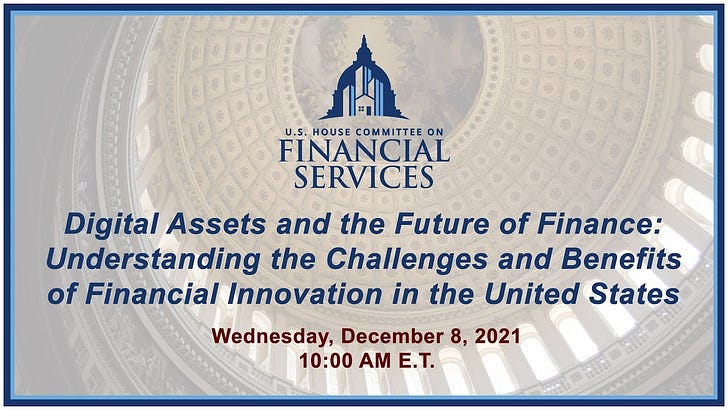I’ve been excited about this market since August. Did I buy any bitcoin in October and November?
No, just two altcoins in October, nothing else. Premium subscribers know what I’m doing now.
If you bought bitcoin at any price higher than today’s $50,000, you’ll be fine. There’s no bad time to buy it. For altcoins, some will reach prices so high, you will feel silly for doubting their prices today.
Are you worried?
I’m not, for the reasons I shared in my recent updates.
Read below for some interesting content you may have missed this week.
If you appreciate my work, please vote for me in any of the Hacker Noon award categories I’m nominated in:
Poll: when will bitcoin’s price go above its all-time high of $69,058?
I’ll share the results and my own answer in the next rundown.
DeFi’s decentralization is an illusion: BIS quarterly review
Bottom line: Bank for International Settlements says DeFi governance features (e.g., DAOs) inherently bring centralized control to decentralized protocols. As a result, regulations should leverage or target those features to protect consumers, curtail criminal activities, and ensure financial stability.
My take: don’t let the shocking headline fool you. This article and the related report offer a balanced, cogent review of DeFi. DAOs both centralize and decentralize power—what consequences come from this? Protocols fail all the time, pegs slip all the time—where do regulators step in? Liquidations on one platform can zap assets on another platform—at what point do users need protection? I could go on.
Why we care: it’s worth reading the whole report if you have the time. DeFi platforms put people at the mercy of a small cohort of anonymous developers and deep-pocketed token holders who probably don’t care about your welfare. Nobody has the patience to let time and technology squeeze out the bad guys. Few can stomach the risks involved in trying. Governments will have to step in. There’s a decent chance this is the kind of report your regulators will be reading. You might want to know what it says.
US Congress spent about four hours chatting about crypto this week.
I caught only about 20 minutes of the hearing starting about an hour into it, long enough to hear former US regulator Brian Brooks, Coinbase CFO Alesia Jeanne Haas, Circle CEO Jeremy Allaire, and others. I also caught bits and pieces of other parts of the hearing.
Substantively, Congressional hearings are purely for show. “Kabuki” as they said when I worked in Congress. All for show. For members, the goal is to get witnesses to say things the members want them to say to make whatever point the members want to make.
Still, I was struck by the sympathetic questions of members and some of the experts’ responses did a great job simplifying and crystalizing the significance of the technology and how it works.
Watch it if you can. It’s unusually educational and informative.
Whether any of this matters for US policy? Debatable, but I can’t see how you can come away with an impression that crypto is anything but a valuable, sensible technology.
That in itself is enough to make this hearing a thumbs-up for me.
Email from Mr. Fox
This RealVision email ponders a recent conflict over rights and ownership of NFTs that serve as works of art or identity. Namely, the decision of LarvaLabs to restrict the commercial rights of CryptoPunks holders.
When you buy an NFT from its creator, should it come with limitations? Do all rights and privileges convey?
Will the market reward one set of rights over another? E.g., will people value NFTs with no strings attached over those with terms and conditions? What about NFTs that have a corporate sponsor to “back” its value (like stocks) instead of NFTs that rely solely on network effects or community appreciation?
What approach will produce a stronger community and the social proof necessary to make NFTs valuable? How do these questions change when you extend them to NFTs that serve as something other than a work of art or identity, e.g., patents and claims on real-world assets?
NON-FUNGIBLE SOUP: NFTS AND EDITIONS
Along those lines, this article from UNDRGRND questions what “scarcity” means when you can print multiple editions of the same piece, each one different in some way.
Investors Selling Significant Amounts of Stock to Buy Cryptocurrency
Bottom line: according to one survey, since June 1, 2021, investor sentiment around crypto has improved relative to sentiment around stocks.
My take: I’m not sure “significant” is the right word here. Most people still prefer stocks to crypto. But if you believe the poll results, you can’t deny that smart money investors are shifting their attention to crypto. Most notably, those who say they pay a lot of attention to financial markets were most likely to sell stocks to buy crypto.
Why we care: this shift happened after the big crash from April to May. People get it—volatile market, new asset class, experimental technology and all that, but there is no better place for common people to get a better return on their investment. Especially with the stock market full of companies that have no profits, insane market caps, or shares priced so high they defy all conventional measures of value.
If you’re selling crypto now, you’re probably selling to somebody richer, more savvy, or more patient than you are.
Relax and enjoy the ride!











Share this post